 Petzlover
Petzlover Bernese Mountain Dog is originated from Switzerland but Smooth Collie is originated from United Kingdom. Bernese Mountain Dog may grow 15 cm / 6 inches higher than Smooth Collie. Bernese Mountain Dog may weigh 25 kg / 56 pounds more than Smooth Collie. Bernese Mountain Dog may live 7 years less than Smooth Collie. Bernese Mountain Dog may have more litter size than Smooth Collie. Both Bernese Mountain Dog and Smooth Collie requires Moderate Maintenance.
Bernese Mountain Dog is originated from Switzerland but Smooth Collie is originated from United Kingdom. Bernese Mountain Dog may grow 15 cm / 6 inches higher than Smooth Collie. Bernese Mountain Dog may weigh 25 kg / 56 pounds more than Smooth Collie. Bernese Mountain Dog may live 7 years less than Smooth Collie. Bernese Mountain Dog may have more litter size than Smooth Collie. Both Bernese Mountain Dog and Smooth Collie requires Moderate Maintenance.
 The Bernese Mountain Dog comes from the Swiss Alps and is one of four separate breeds called Sennenhund or “Alpine pasture dog”. The Name Bernese Mountain Dog indicates the area of Switzerland that the dogs come from – the canton of Bern. These groups of dogs accompanied the dairymen and herders and they were farm dogs. They pulled carts, delivered goods from village to village. The Bernese Mountain Dog was part of this group along with: Greater Swiss Mountain Dog, Appenzeller,Entlebucher Mountain Dog and the Bernese Mountain Dog. It is probably true that the Bernese Mountain Dog has been a part of farm life in the Alps for over 2000 years.
The Bernese Mountain Dog comes from the Swiss Alps and is one of four separate breeds called Sennenhund or “Alpine pasture dog”. The Name Bernese Mountain Dog indicates the area of Switzerland that the dogs come from – the canton of Bern. These groups of dogs accompanied the dairymen and herders and they were farm dogs. They pulled carts, delivered goods from village to village. The Bernese Mountain Dog was part of this group along with: Greater Swiss Mountain Dog, Appenzeller,Entlebucher Mountain Dog and the Bernese Mountain Dog. It is probably true that the Bernese Mountain Dog has been a part of farm life in the Alps for over 2000 years.
In some regions of the Alps, these dogs were called Durrbachhund after a small town named Durrbah and are said to be rooted in the Molosser breeds. Tin 1902 the Swiss Kennel Club recognized the Bernese Mountain Dog as a separate breed and the first breed club was founded in 1907 in the region of Burgdorf. The first standard for the breed was written and separated the 4 dogs into their own breeds. The Molosser is an ancient breed whose versatility and travels made it expressly influential in the developing of Mastiff dogs like St. Bernards, Great Pyranees, Mastiffs and Swiss Mountain Dogs like the Bernese.
However at the end of the 19th century famers and shepherds began to import other breeds of working dogs, while at the same time automated modes of transportation began to replace the farm dogs. Under these circumstances the number of Bernese Mountain Dog began to decline and the breed faced potential extinction. A group of people were gathered together to save the Berner, including Franz Schertenleib and Albert Heim. Still today the Bernese are in short supply and because of the need and desire to increase the numbers, some breeding practices have not been as good as they should have been. However, today’s Berner is a great family dog and he still loves to work. He is good at carting, herding, search and rescue, watch dog, tracking, and competitive obedience.
The Bernese Mountain Dog came to the US after World War I and was imported to Britain in the 1930’s. The AKC accepted the Berner as a new Working-Class breed in 1937. It was not until 1968 that the Bernese Mountain Dog Club of America was formed. In 1981, the AKC accepted the club as a member and in 1990 they (AKC) adopted the standard used today to judge the Bernese Mountain Dog.
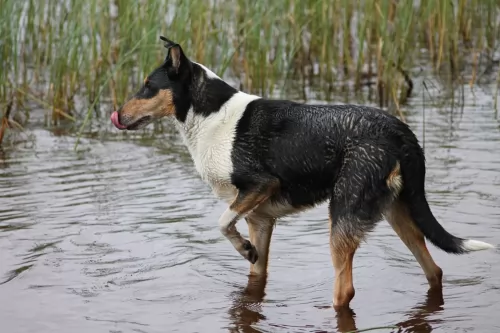 When you see the Smooth Collie you just assume that you’re looking at a long-haired Lassie-type Collie that was sent to the groomers.
When you see the Smooth Collie you just assume that you’re looking at a long-haired Lassie-type Collie that was sent to the groomers.
The Smooth Collie has always been used for herding purposes and is a short haired version of the Rough Collie. The early history of this dog is unknown and there are quite a few stories surrounding its history.
It seems as though the dog’s history started during the reign of Queen Victoria who is believed to have owned these dogs.
In some countries it is thought that the smooth- and rough collie are one and the same while in other countries they are classified as separate breeds. The dog hails from the United Kingdom and they classify the Smooth Collie as a separate breed from the Rough Collie.
 The Bernese Mountain Dog is a large, lovable clown. He has a heavy build with a tri color- mostly black – coat. He should have a white chest and rust coloring on the front of his legs, the sides of his mouth, and above his eyes. His eyes should be dark and blue eyes are a disqualification. His coat is silky, thick and long. He has medium sized triangle shaped ears and a scissors bite. He has round toes and strong, straight legs, He is well suited to cold weather. His skull is broad and flat, his muzzle is straight and strong, his nose must be black, and he does not usually drool.
The Bernese Mountain Dog is a large, lovable clown. He has a heavy build with a tri color- mostly black – coat. He should have a white chest and rust coloring on the front of his legs, the sides of his mouth, and above his eyes. His eyes should be dark and blue eyes are a disqualification. His coat is silky, thick and long. He has medium sized triangle shaped ears and a scissors bite. He has round toes and strong, straight legs, He is well suited to cold weather. His skull is broad and flat, his muzzle is straight and strong, his nose must be black, and he does not usually drool.
He is an imposing sight, but he is also as non-aggressive as any breed. He is strong, intelligent, and agile. He should have his dew claws removed. This breed should be self-assured, yet good natured and calm. He is welcoming to strangers and loyal to his people. He needs his people.
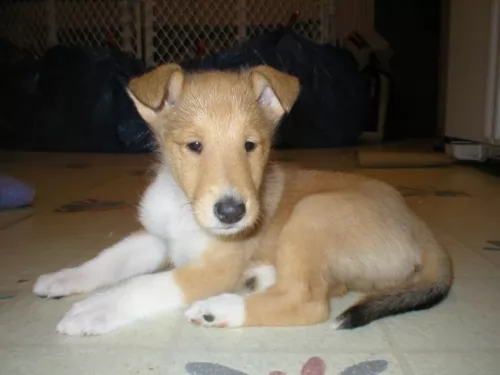 The Smooth Collie is a medium to large sized dog, ranging in size from 51–56cm and weighing anything from 18kg to 30kg.
The Smooth Collie is a medium to large sized dog, ranging in size from 51–56cm and weighing anything from 18kg to 30kg.
The Smooth Collie is slightly longer than it is tall and he has a deep chest. Most people are very familiar with the sweet, gentle expression of the Collie dogs.
The dog also has the long slender head, the semi-erect ears and a long tail. The coat of the Smooth Collie is dense and long with the outer hair being straight and harsh. The Smooth Collie comes in different colors – fawn, reddish brown, white,grey, black and tan.
The Smooth Collie is generally an amicable dog, sociable and friendly. He loves his human family and wants to be constantly with them, showing signs of separation anxiety when left for long periods on his own.
He is intelligent too so that he is easily trained. He is totally non-aggressive but that doesn’t stop him from being an excellent watchdog and he’ll alert you to strangers approaching you or your home.
They’re also energetic dogs and will require regular exercise. Although these Smooth Collies make splendid family pets, they are still used for herding purposes.
 When reading the AKC standard for the Bernese Mountain Dog you will find that the breed is good natured and self-assured. They are not aggressive, shy or anxious. These are gentle, loving dogs. At the same time, they should be socialized to all kinds of animals, people and children when they are puppies. They are happy outside but need to live in the house with their people. They need exercise and play, and because they are so large, they need this outside. But when it comes to cuddling and sleeping they need to be indoors.
When reading the AKC standard for the Bernese Mountain Dog you will find that the breed is good natured and self-assured. They are not aggressive, shy or anxious. These are gentle, loving dogs. At the same time, they should be socialized to all kinds of animals, people and children when they are puppies. They are happy outside but need to live in the house with their people. They need exercise and play, and because they are so large, they need this outside. But when it comes to cuddling and sleeping they need to be indoors.
They love children though you should be careful with small children because of the Berner’s size and their not being aware of their size at times. They are extremely loyal to their people and want to be with people. They are intelligent, and they want to please their people. At the same time, they are sensitive. They do not respond well to punishment or harshness. They are imposing but they are lovers at heart.
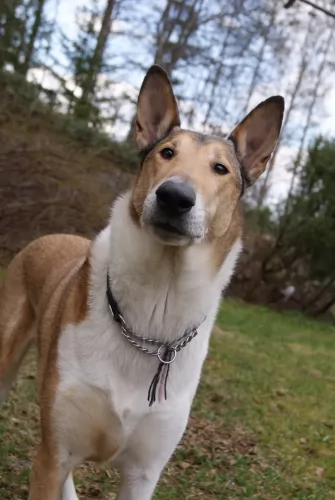 Not only is he intelligent, he is playful and energetic too, making a good pet for children and tolerating other pets too.
Not only is he intelligent, he is playful and energetic too, making a good pet for children and tolerating other pets too.
Add to that the fact that he is a a good watchdog and wants to protect his family. Sweet and gentle, the Smooth Collie is guaranteed to make a wonderful addition to your family.
 Even though it is well known that cancer is the leading cause of dog deaths across the globe, the Bernese Mountain Dog is particularly prone to die of cancer. Half of all Berners compared with 27% of all dogs, die from cancer. The Berner’s life span is also shorter than most dogs his size. IT is also not just one cancer that attacks the Bernese Mountain Dog but rather at least 6 or more including mast cell, osteosarcoma, malignant histiocytosis, fibrosarcoma, and lymphosarcoma.
They can also suffer from PRA (Progressive Retinal Atrophy), hypoadrenocorticism, cataracts and histiocytic sarcoma. Another issue that plaques the Berner more than other breeds is musculoskeletal issues that cause mortality. This can include issues such as cruciate ligament rupture, arthritis and hip dysplasia. These types of aliments cause death in 6% of the breed while they are usually the cause of mortality in only 2% of all other dogs.
Even though it is well known that cancer is the leading cause of dog deaths across the globe, the Bernese Mountain Dog is particularly prone to die of cancer. Half of all Berners compared with 27% of all dogs, die from cancer. The Berner’s life span is also shorter than most dogs his size. IT is also not just one cancer that attacks the Bernese Mountain Dog but rather at least 6 or more including mast cell, osteosarcoma, malignant histiocytosis, fibrosarcoma, and lymphosarcoma.
They can also suffer from PRA (Progressive Retinal Atrophy), hypoadrenocorticism, cataracts and histiocytic sarcoma. Another issue that plaques the Berner more than other breeds is musculoskeletal issues that cause mortality. This can include issues such as cruciate ligament rupture, arthritis and hip dysplasia. These types of aliments cause death in 6% of the breed while they are usually the cause of mortality in only 2% of all other dogs.
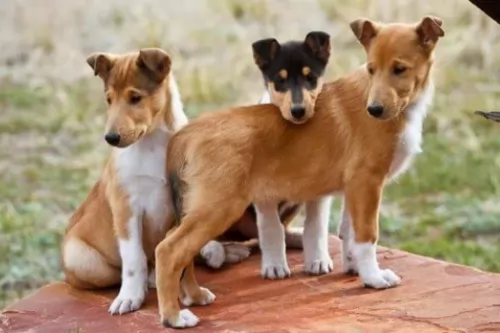 Your gentle smooth haired collie can live to be 12 to 14 years of age if he enjoys a good life, but like with other dog breeds, they can also be susceptible to certain common dog illnesses.
Your gentle smooth haired collie can live to be 12 to 14 years of age if he enjoys a good life, but like with other dog breeds, they can also be susceptible to certain common dog illnesses.
This is when the chromosomes that determine how the eyes develop are mutated, so that the blood vessels that nourish the retina and absorb scattered light are underdeveloped. When this mutation occurs it is in both eyes, but one eye could be more severely affected than the other.
Your vet will do a complete examination of your dog’s eyes to find out what the extent of the defect is.
This is a life threatening problem where the stomach twists. It is more prevalent in deep chested dogs. It can help by feeding your dog two smaller meals a day instead of one larger one which he gobbles up quickly.
Also known as Gray Collie Syndrome, this rare disease affects the neutrophils of a dog, which are an important part of the immune system. Bacterial infections and a shortened lifespan are your dog’s lot with this illness.
 As with any large purebred dog, the Bernese Mountain Dog needs high quality food that will provide hi with nutrition and keep him from becoming overweight if fed properly. He is however a very large dog with a very large appetite. Watch his calorie intake. It’s ok to use treats if you fit them into the overall calorie intake for the day. Feed him smaller meals twice a day.
As with any large purebred dog, the Bernese Mountain Dog needs high quality food that will provide hi with nutrition and keep him from becoming overweight if fed properly. He is however a very large dog with a very large appetite. Watch his calorie intake. It’s ok to use treats if you fit them into the overall calorie intake for the day. Feed him smaller meals twice a day.
As previously mentioned the breed has quite a few health challenges to deal with, cancer being the number one issue. The small genetic line is one of, if not the main, culprit in this high mortality rate and short life span of the Bernese Mountain Dog. In addition to the conditions mentioned above, they are also susceptible to bloat (stomach inversion). In addition, they face the conditions mentioned previously and should be tested for dysplasia of the hip and elbow, Von Willebrand’s Disease, Cardiac testing and an eye or ophthalmologist exam.
The Bernese Mountain Dog is a gentle giant. They have a calm happy demeanor and they love to work. In fact, they need to work. They love children and will quickly give them cart rides. They compete in carting competitions and herding events sponsored by the AKC. They need exercise but not an extreme amount or intense type. A half-hour a day is enough for them. They love long walks or hiking. They are great companions for backpacking or camping. They are also good at tracking, rally, obedience, and agility.
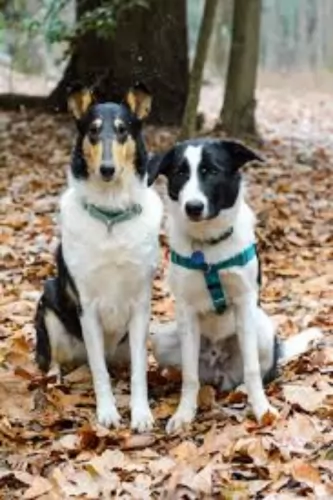 Your Smooth Collie deserves the very best food there is because of the wonderful companionship he provides you with. You want him to enjoy good health and a long life with you.
Your Smooth Collie deserves the very best food there is because of the wonderful companionship he provides you with. You want him to enjoy good health and a long life with you.
If you buy one of the commercially manufactured dog foods, make sure it is one of the best – packed with vitamins and minerals and good, natural ingredients.
Follow the instructions on the packaging for portion sizes. Also include some plain, wholesome dog food made at home. The perfect example of this is boiled chicken, brown rice or pasta and sweet potatoes, spinach and carrots all chopped up and added to your dog’s dry kibble as a treat twice a week. No need to add in exotic spices. Avoid onions.
Try and include some raw meat into the diet once in a while too. Make sure your Smooth Collie has a constant supply of fresh, cool water.
This is one of the best things you can do for your Collie, eliminating the possibility of your pet becoming a parent of unwanted puppies.
Brush your Smooth Collie twice a week. He is a moderate shedder but has a couple of heavier shedding periods.
While brushing your pet, check inside the ears for signs of infection, check that his eyes are still bright and alert and check inside his mouth for bad teeth. He can’t tell you about a rotting tooth and this can cause a host of other problems for your dog.